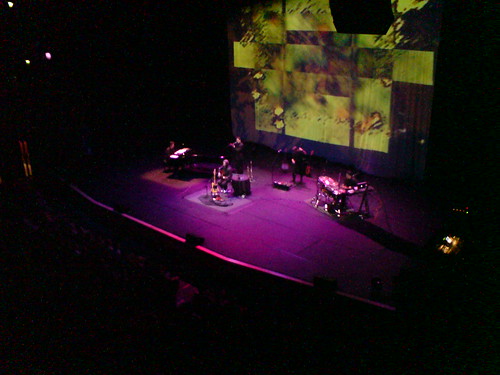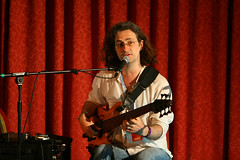One of the great things about teaching bass is that questions, comments and observations from my students spark off trains of thought that get me reconsidering the nature of what we do as musicians, and obviously more specifically as bassists.
I was talking this morning with a student about the art of simple bass – the zen of bass – playing lines that on the surface are almost mind-numbingly simple, but thanks to the whole universe of intention that can exist in every note, can utterly define the song.
One of the examples we used was Nick Seymour of Crowded House. Neil Finn is a genius songwriter, truly one of the great songwriters of the last 20 years, IMHO. But what is it about Crowded House that stops them from sounding like a stadium emotional rock band? Largely, it comes down to two things – the production ideas of Mitchell Froom and Tchad Blake, and the rhythm section of Nick Seymour on bass and the late and dearly missed Paul Hester – the production stuff adds tonnes of variety to the arrangements – guitar sounds popping up for two bars and then vanishing again, processed bits of voice and weirdness coming in and out. But the rhythm section do one really crucial thing that lots and lots of modern bands miss – they don’t play in the studio like they’re playing in an arena. One of the tragic things that happens to bands when they break into the arena-gig-world is that they start writing songs, and more importantly arranging songs, to fit in that environment. You only have to compare the first two Coldplay albums to hear the difference. The first Coldplay album is a gorgeous fragile intimate affair – sure, there’s plenty there that can be turned into flag-waving stadium bombast when required, but the record doesn’t sound remotely like that. The two albums that followed are both written for stadiums, and mastered for radio. They don’t make that distinction between tracks that sound great when played on your own at home and arrangements of those tracks that sound great in front of 40,000 people.
And in those arrangements, the first things to vanish are the intricacies and interest in the rhythm section – compare what Adam Clayton was doing on Unforgettable Fire with just about anything he’s done since…
It’s what I think of as ‘Journey Syndrome’ – writing songs for stadiums. It’s the death of subtlety. The stadium rock bands of the 80s did it, in those innocent irony-free days. Before them, bands seemed to be able to make it work. Fleetwood Mac’s ‘Rumours’ doesn’t sound like a stadium record, the 70s Aerosmith records don’t sound like Stadium records – they were just great records that translated well into that environment, but still worked at home. Crucially, they weren’t squashed into a 5dB dynamic range like so much unlistenable modern rock. It’s so depressing that the hundreds of bands around now trying desperately to sound like Talking Heads have missed the genius of the Talking Heads sound: Space. As Candy Flip told us in the early 90s. You Need Space. Talking Heads were all about Space. So many recent bands that I really like in principle are messed up by writing for arenas and mastering for radio. Muse, The Killers, Kaiser Chiefs. All largely unlistenable on record, unless you’re playing them on the really shitty little stereo in the kitchen or on laptop speakers. Muse and the Killers both mess up my theory about dull rhythm sections, in that they both have really cool bassists, though I haven’t heard the second Killers album, so need to give it a spin and see if they’ve gone the way of Coldplay…
Some bands never got what the bassist was for in the first place – for all their desperation to sound like The Beatles, Oasis had one of the shittest bassists ever to strap on the instrument in poor ole Guigsy. He really couldn’t play. As in Alec John Such level uselessness. Missing the vital point that one of the things that was most remarkable about the Beatles was that in the later years, Paul and Ringo were the UK end of a transatlantic axis that changed the world of rhythm sections for ever – the US end being the Funk Brothers at Motown. McCartney’s bassy stuff was integral to the sound and genius of the Beatles. Imagine Guigsy playing Penny Lane, Paperback Writer, Rain, Maxwell’s Silver Hammer etc… Again, Oasis’ obsession with being the world’s biggest band extended to them arranging their stuff to be sung on the terraces – where it does indeed sound amazing – but meant that they were never going to be artistically a sensible comparison with the Beatles, even as Beatles copyists…
For one great example of how a rhythm section can make or break a song, have a listen to the Fleetwood Mac original of Dreams, and then the Corrs remake. Andrea Corr has a lovely voice, and does a pretty nice version, albeit a carbon copy of the phrasing and shape of the original. But the utterly soulless anodyne arrangement of their version that loses all of the tension, space and human feel that made the whole of the Rumours album so good. The Corrs version is pretty much music for people that really don’t care about music. It’s good, it’s just not good. Music by committee. This isn’t meant to turn into a rant about the Corrs – gawd bless their freakishly perfect gene pool – more a word of caution to those of you in bands not to get caught up writing music for arenas, not to get obsessed with making your album as loud as it can possibly be. If you have to, do a super-compressed version to send to radio, just don’t make the rest of us suffer through it.
Last week, I witnessed an absolute masterclass in how to play bass in a stadium – the Police reunion show at Twickenham. For all his musical sins of recent years, Sting, in the context of the Police, is still one of the most imaginative, interesting and instantly recognisable rock bassists around… bizarre given that he’s playing lines that he wrote almost 30 years ago, which still sound fresher than 90% of what’s around today. The Police’s sound always had loads of space in it, in between Stewart Copeland’s out of time but full of energy drumming (still drifting all over the place tempo-wise, but crammed with that punkish drive that made them so compelling first time round) and Andy Summers spacey delay-drenched guitar parts (until he attempted an ill-advised jazz workout on, I think, So Lonely – not to put too fine a point on it, it was a disaster). Still, Sting and Copeland put on a show of just how defining a rhythm section can be if the musicians put their mind to it. Proper magic. (click here for my photos of the gig.)



